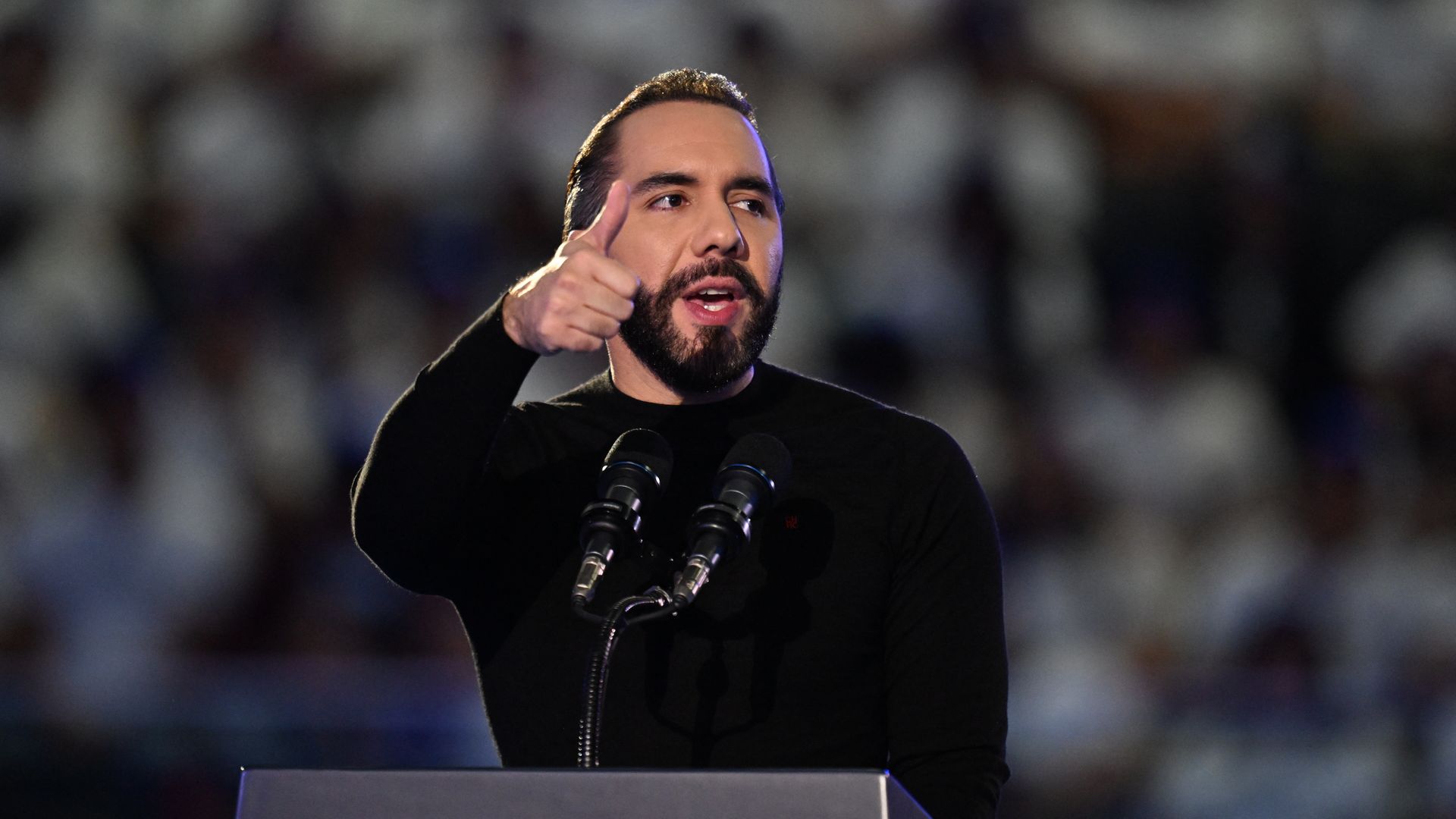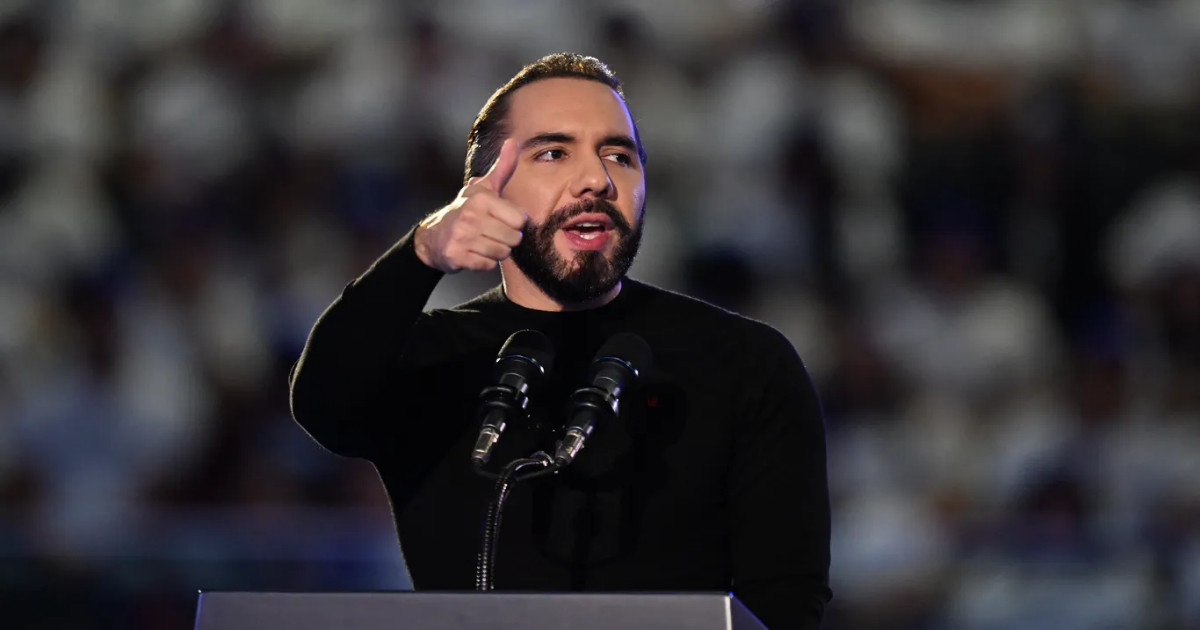
El Salvador’s President Nayib Bukele is meeting with President Trump Monday as the U.S. has ramped up its deportations to the Central American nation.
The big picture: Bukele — the self-described “world’s coolest dictator” —agreed to warehouse migrants and criminals deported from the U.S. in its notorious prison system, solidifying the country as a key ally for the Trump administration.
- Trump lauded Bukele in a Saturday Truth Social post for accepting U.S. deportees, writing, “[t]hese barbarians are now in the sole custody of El Salvador, a proud and sovereign Nation, and their future is up to President B and his Government.”
- The partnership has come with other perks. Before Bukele’s visit, the U.S. State Department changed its travel advisory rating for El Salvador to Level 1: Exercise Normal Precautions — effectively rating it as safer for travel than countries like France and the United Kingdom, which currently have a Level 2 rating.
Here’s what to know about Bukele ahead of his White House visit:
Nayib Bukele’s political career and elections
Bukele, 43, is a former mayor of San Salvador. He was first elected president in 2019 as a third-party candidate of the center-right GANA party.
- In 2017, he was expelled from the left-wing FMLN party following an internal dispute and frequent criticism of party leadership.
- He ran on an anti-corruption platform and leaned heavily on his popularity on social media to snag his historic victory in 2019.
- He steadily won reelection in 2024 with 84.7% of the vote, according to the Associated Press. Despite the election results not being finalized, Bukele declared victory hours after polls closed.
State of play: While in office, Bukele has taken a strongman approach to governing.
- Once, he ordered armed police and soldiers to enter the Legislative Assembly building in a show of intimidation amid a push for legislation to better equip them.
- He seized immense power in the courts after using legal maneuvers to replace former judges with ones named by allies, Axios previously reported.
Case in point: Bukele ran for re-election despite the country’s constitution technically forbidding it after getting the go-ahead from a branch of the Supreme Court whose members were largely named by his party, Nuevas Ideas.
- Due to Bukele’s “immense popularity,” there has been limited public reaction to the deterioration of democratic norms, per a review by human rights advocacy group Washington Office on Latin America.
Bukele’s “iron fist” and crackdown on gangs
Bukele’s popularity is in large part driven by his crackdown on gangs in El Salvador.
- Under a state of emergency declared in 2022, law enforcement could incarcerate anyone suspected of gang activity without a warrant.
- His measures led to a drastic drop in violent crime — but they also sparked human rights concerns. Critics say the crackdown has come at the expense of civil rights.
One stunning stat: A Time profile on Bukele published in August of last year, found that one in every 57 Salvadorans was incarcerated at the time.
Bukele’s work with Trump on immigration
The Trump admin has sent over 200 migrants to the notorious Salvadorian Center for Terrorism Confinement prison.
- A CBS News 60 Minutes report found that 75% of the 238 migrants flown from Texas to CECOT had no apparent criminal record.
- Earlier this year, Secretary of State Marco Rubio announced that Bukele had offered to accept deportees of any nationality in “an act of extraordinary friendship.”
- Bukele also offered to house “dangerous American criminals in custody in our country, including those of U.S. citizenship and legal residents,” Rubio said.
Catch up quick: Two planeloads of Venezuelan migrants whom the Trump administration alleged were gang members took off for El Salvador in March.
- The flights took place despite a federal judge ordering a halt of the controversial deportations under the Alien Enemies Act of 1789 and for any flights to turn around.
- Bukele mockingly shared a story about the judge’s order halting the flights on X, writing “Oopsie… Too late.”
- The Supreme Court earlier this month ruled that the Trump administration could resume use of the Aliens Enemies Act for deportations.
- Rubio on Sunday announced that another 10 alleged members of MS-13 and Tren de Aragua had arrived in El Salvador.
Zoom in: In a high-profile case, the Trump admin erroneously deported Kilmar Armando Abrego Garcia, a Salvadoran national who was living in Maryland, to the country.
- The Supreme Court ruled that the U.S. government must takes steps to facilitate his return, but the Trump administration has not complied with court orders or committed to do so thus far.
Between the lines: Abrego Garcia’s court-mandated return trip could be a topic of conversation Monday.
- Earlier this month, Bukele responded to a post about a district court judge who ordered the administration to bring Abrego Garcia back with a gif of a confused cartoon bunny.
What we’re watching: Trump has said he’d be “all for” sending U.S. citizens convicted of crimes to prisons in El Salvador, though he added he didn’t know “what the law says on that.”
- Press Secretary Karoline Leavitt told reporters that path would be for “heinous, violent criminals who have broken our nation’s laws repeatedly.”
Go deeper: Exclusive: ICE decides who’s linked to gangs, border czar says
